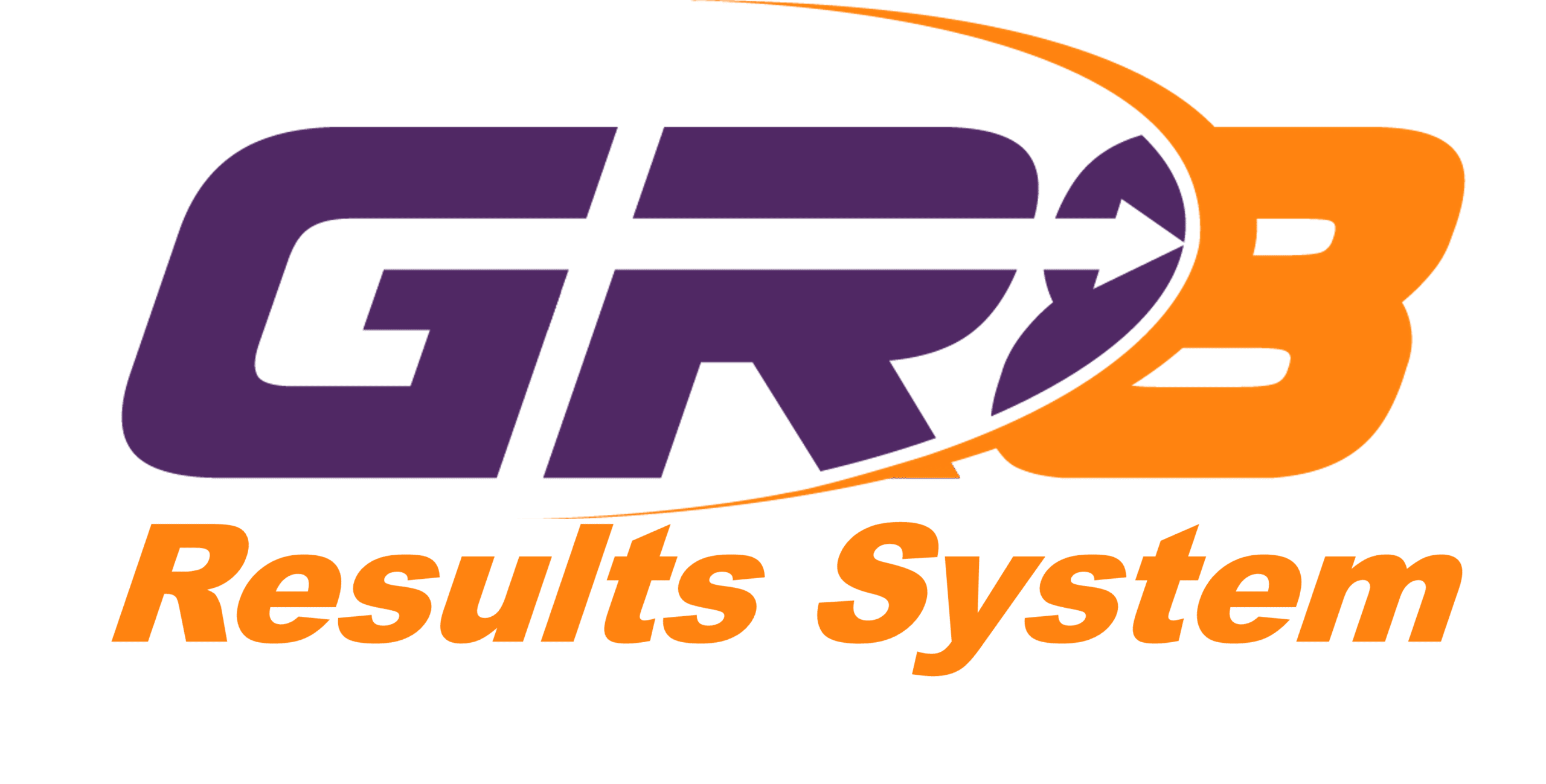The Results AND Relating principle offers a straightforward, impactful, and holistic approach to leadership. Its simplicity and ease of application come from blending two key aspects of working with people.
These two elements can be characterized in various ways, such as:
assertive and cooperative
powerful and relational
separate and belonging
results and relating
However, the combination of Results AND Relating is typically the most intuitive and clear.
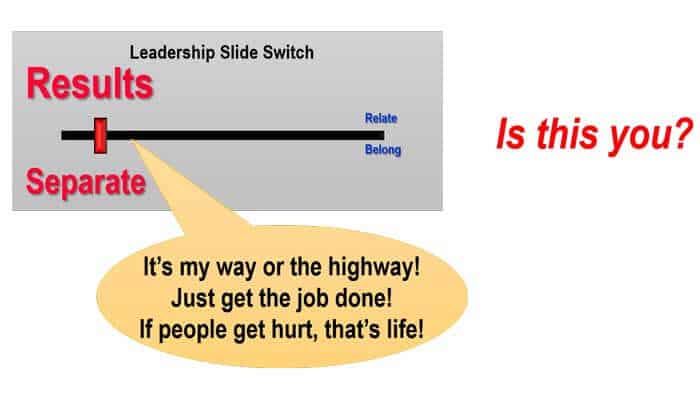
The Slide Switch
In the graphic above, the red bar on the black line can move left or right and can be positioned anywhere along the line. When the bar is on the Powerful or Results side, the words associated with that side are larger. However, if the bar shifts to the Relating side, the words related to Relating will become more prominent, as shown in the graphic below. This visual helps you understand a leader’s range of behaviors when interacting with others.
If the red bar is more to the left, the behavior leans towards Results, Powerful, or Separate.
If the red bar is more to the right, the behavior leans towards Relating, Belonging, or Relational.
Distorted Leadership – Focused on RESULTS
The Results AND Relating principle directly influences your leadership style. Right now, you might be overemphasizing one side, which could negatively affect your leadership.
Consider how you typically respond in various situations. Do you tend to focus more on Results (Separate or Powerful)? If so, you might express thoughts like, “It’s my way or the highway!” “Just get the job done!” or, “If people get hurt, that’s just part of it.”
This tendency often leads to more dominant, forceful, vocal, or even angry actions and attitudes toward others. However, it's important to note that being quiet doesn’t necessarily mean you're not on the Results side.
It’s not about being loud; it’s about prioritizing tasks and outcomes while paying little attention to the people involved. In essence, achieving results takes precedence over building relationships. You are someone who prefers control, and while you do engage with others, their needs are secondary.
The further the bar moves to the left on the slide switch, the more focus there is on results and less emphasis on building rapport with others.
Distorted Leadership – Focused on RELATING
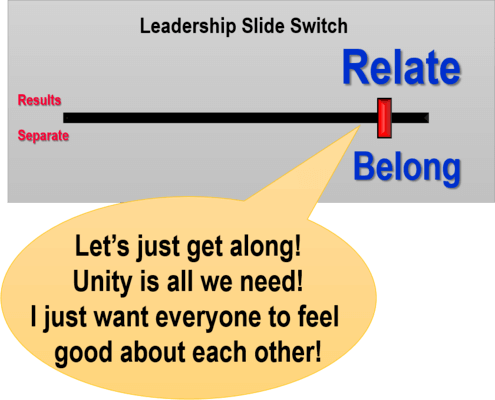
Alternatively, you may direct more energy towards Relating (Belonging or Relational) — the right side of the spectrum. This often leads to statements like, "Let’s just get along!" "Unity is all we need!" or, "I just want everyone to feel good about each other!" You might avoid creating discomfort for others and even agree with someone, even if you don’t truly believe it.
Relating energy values people, not to the exclusion of results, but as the priority over results. The further to the right you go, the less focus you place on outcomes and the more energy you invest in maintaining harmony with others.
On the Relating side, manipulation can become a key tool for influencing people. For instance, if you want to persuade someone, rather than force your ideas on them, you might subtly influence them to align with your perspective without them realizing it. This contrasts with the Results side, where domination and intimidation are often the primary tools of control. Both sides are ultimately controlling, but they manifest in different ways. And in the end, both styles tend to backfire, as those trying to control others often find themselves controlled instead.
Questions to Help You Move Toward Relating
Most people tend to gravitate more toward one side than the other. However, regardless of your natural inclination, you can learn to incorporate both Results AND Relating into your leadership approach.
You probably have a sense of which side you prefer. If you're unsure, ask those around you for feedback. If you tend to lean more toward the Results side, you may overlook important relational or people-oriented principles. To shift the focus more toward Relating, try asking yourself questions like these:
- What principle about Relating am I ignoring?
- Am I caring for and about others?
- Am I considering the power of gentleness?
- Do I use the truth with mercy?
- Am I pursuing their best?
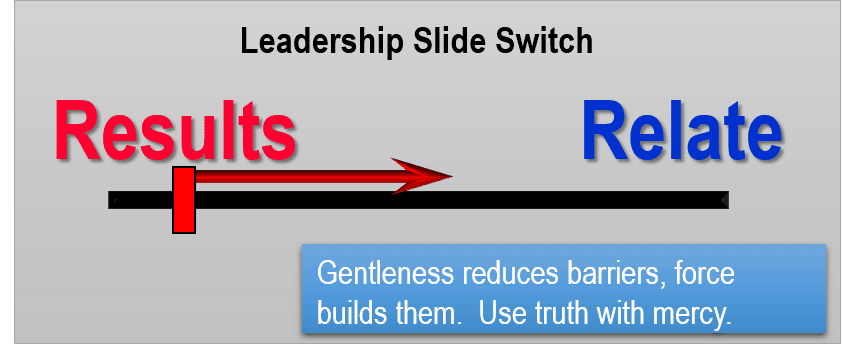
For people on the Results side, remember, "People get results." Results don’t happen on their own; it takes people to drive them. This means that developing better ways to relate to people will help you achieve the results you're aiming for.
It’s perfectly fine to expect a lot of work from others in order to reach your goals. However, relying too heavily on this can lead to a culture of rebellion. People will comply with force, but only up to a point. As a leader, compliance isn’t your ultimate goal; you want to bring out the full potential of your team to help achieve the desired results. Approaching people with gentleness, grace, and freedom can break down barriers and foster more genuine engagement.
Look for ways to incorporate more Relating into your leadership approach.
Questions to Help You Move Toward Results
On the flip side, if your natural tendency leans more toward Relating, you might avoid taking a stand or doing what’s right when others aren’t. If you want to shift more toward Results, consider asking yourself questions like these:
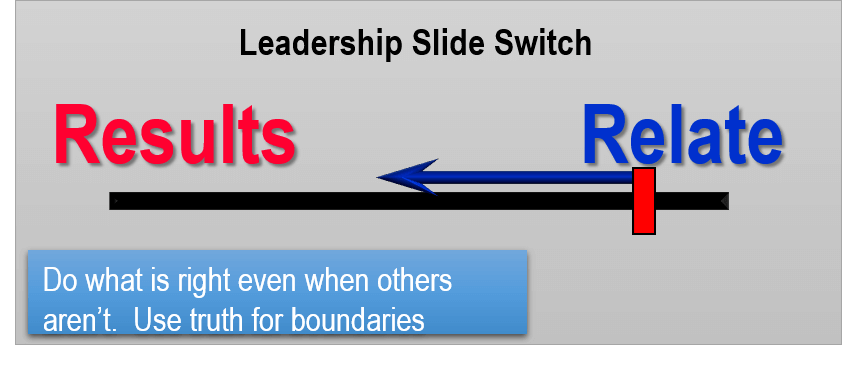
On the Relating Side, your focus is on people—you want to get along, belong, and be accepted. Sometimes, though, the other person in the relationship might be more Results-focused and take advantage of you. Or, they could be on the Relating side as well, which might mean values, boundaries, or truth are being overlooked. In either case, work is needed to improve the health of the relationship.
Shifting the balance toward Results requires strength and courage.
Results AND Relating ISN'T About Balance!
Recognizing your natural tendency may provoke an undesirable response—either swinging to the opposite side or even going to an extreme. Once you try to operate on the opposite side, you may realize you lack experience or find it harder to work that way. This often leads you to return to your original tendency, and when that feels wrong, you swing back again. This creates a back-and-forth motion between Results and Relating.
This back-and-forth happens because you may view one side as excluding the other, which is where leadership can become distorted. The answer isn't to swing between extremes but to find the right proportion. This is NOT about achieving a perfect balance!
At times, an extreme approach is actually the right one. For example, consider situations where Results or Power are the priority. If someone steps into the path of an oncoming bus, would you hesitate to shout or push them out of the way? Of course not! In that moment, you need to act decisively and prioritize Results.
On the other hand, if someone is grieving a tragedy, it's not the time to focus on Results. Instead, you need to show compassion and care, just like a mother caring for a newborn. In this case, Relating is crucial.
Proportion Changes Your Thinking
When you understand and apply the right proportion, it transforms your mindset. You begin to see the bigger picture—valuing and developing people while also achieving results. Your thinking shifts to ideas like:
Others may need to change, but that change is their responsibility.
I can invite others to change, offer truth to them, and let them face the consequences of not changing.
My job is not to change others, but to pursue their best, even if they don’t change.
Getting things done is important, but not if it harms people.
Sharing the truth is essential, but it should be done with love.
Harmony is valuable, but not at the expense of doing what’s right.
Relate and belong with others, but always with boundaries.
Make decisions based on values, not reactive emotions.
Whether you lean more toward Results or Relating, your leadership needs to use the right proportion to be a GR8 Leader.
Results need Relating, and Relating needs Results.
The optimal approach is the combination and proportion of both.
